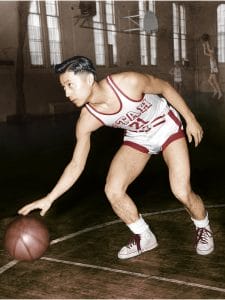Born in Ogden, Utah, of Japanese parents, Misaka said his home town ran under “virtual apartheid”: restaurants wouldn’t serve him, and he remembers people crossed the street to avoid him. “That’s just how it was,” he said years later of the racism. He escaped into sports: football, baseball, and basketball. A point guard (the leading offensive player in basketball), Misaka led Ogden High School to win the Utah State Championship in 1940, and went on to play with the Utes at the University of Utah, while other Japanese Americans were rounded up for internment camps to ride out World War II. His team was chosen for the college basketball National Invitation Tournament in New York City. They lost to Kentucky in the first round, but Arkansas had to withdraw, and Utah was given a second chance to fill out the sixth seed. They won the championship in overtime.

When Misaka finally got home, his mother was holding his draft notice: the U.S. Army assigned him to military intelligence — he was to be part of the invasion of Japan. When the atomic bomb ended the war, he still went to Japan as part of the occupying force — and found his family home in Hiroshima, which survived the blast. His uncle was shocked to see him. “To the Japanese, I was an invader,” he said, but “Americans didn’t trust me because I was Japanese.” After two years of service, he was discharged in 1947, went back to the U of U, and rejoined the Utes, which was again invited to the NIT. This time, they won against Kentucky — in the final round, to win the championship again. That attracted the attention of pro teams, even though he was only 5 foot 7 inches and 150 pounds: Misaka was drafted by the New York Knicks, making him the first non-white player in the National Basketball Association (then called the Basketball Association of America). It was the same year that Jackie Robinson broke the color barrier in baseball. Misaka was cut after just three games, and turned down an offer from the Harlem Globetrotters, finished his degree in engineering, and spent his career as an electrical engineer in Salt Lake City. Wataru “Wat” Misaka died in Salt Lake City on November 20. He was 95.
